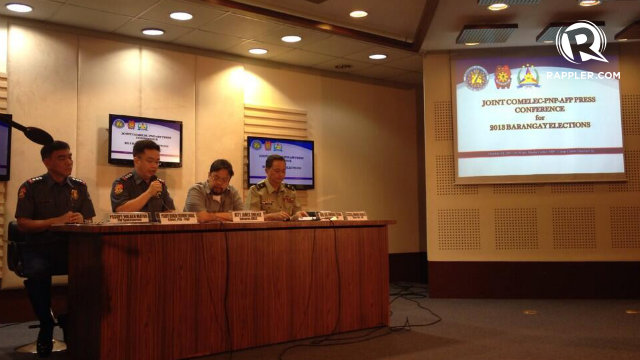SUMMARY
This is AI generated summarization, which may have errors. For context, always refer to the full article.

MANILA, Philippines – Five days to the barangay polls on Monday, October 28, the Commission on Election (Comelec) still needs to put together P400 million for the exercise.
The poll body remains confident, however, the needed funds will come just in time, Comelec spokesman James Jimenez said at a briefing with police and military officials on Thursday, October 24.
The Armed Forces of the Philippines (AFP), the Philippine National Police (PNP), and the Deparment of Education (DepEd) originally asked for P500 million for the conduct of the elections.
These agencies are deputized by the Comelec every election. The amount they require for the 2013 barangay polls is apart from the P1.175 billion allocated by Congress and which, the Comelec said in a July 10 resolution, was not enough.
Of the P500 million needed by PNP, AFP, and DepEd, the Comelec only has P100 million so far, and this would be available by the end of the week yet.
“Money is already available, but paperwork needs to be completed. The memorandum of agreement is being processed,” said Jimenez at the joint press briefing with PNP and AFP in Camp Crame, Quezon City.
As for the P400 million, “Maihahabol yan,” he said. (The funds will make it in time.)
One way the Comelec is trying to raise the funds is by requiring local government units to utilize P10,000 per barangay in the upcoming polls. The amount will be charged against the barangays’ general fund.
There are 42,028 barangays across the country – their contributions will total P420.28 million – although the elections in conflict-torn Zamboanga City and quake-hit Bohol province have been postponed to November 25.
Barangay officials are protesting the Comelec requirement.
Jimenez said collections thus far have been short, and that Comelec is shouldering the gap.
The “unjustified refusal” by barangay officials to use their general fund for the conduct of the polls would count as an election offense against them, Jimenez said.
Meanwhile, the expenses to be incurred by the PNP and the AFP will be charged against their respective funds, and will be reimbursed by the poll body once money comes in.
Hotspots
Philippine police is closely monitoring 7,060 barangays that are in the elections watchlist areas (EWA). (READ: Barangay elections: Know what’s banned, and more)
Thirty-nine barangays in Metro Manila are considered EWAs:
- Manila – 12
- Paranaque – 7
- Makati – 4
- Taguig – 4
- Navotas – 2
- Pasay – 2
- Caloocan – 1
- Pasig – 1
- Quezon City – 1
- Malabon – 1
- Valenzuela – 1
- Las Piñas – 1
- Muntinlupa – 1
- Pateros – 1
Nineteen people have been killed in election-related incidents as of October 23. Another 24 were wounded, while 5 were unharmed.
Of those killed, 10 were incumbent barangay officials.
The Autonomous Region of Muslim Mindanao, the Bicol region, Soccsksargen, Central Visayas, and Eastern Visayas tallied the most EWAs per region.
In Soccsksargen, 54.39% of the barangays are considered EWAs.
Among provinces, Lanao del Sur, Maguindanao, and Bohol tallied the highest number of EWAs. Barangays elections in the province of Bohol, however, have been put on hold following a devastating magnitude 7.2 eartquake.
Monitoring threats, vote buying
Incidents of extortion are also being monitored by both police and military forces, said AFP spokesman General Domingo Tutaan. Intelligence and information operatives have been dispatched by the military to pinpoint and combat extortion in the barangays.
“We are also monitoring candidates from threat groups,” said PNP Public Information Office Chief Senior Superintendent Reuben Theodore Sindac.
Most ballot boxes, meanwhile, have been dispatched by Comelec. Only the ballot boxes for precincts in Metro Manila and nearby provinces are still with Comelec, but will be dispatched before the weekend.
Even as Comelec’s Jimenez urged citizens to be vigilant when it comes to anomalies in the elections, he also emphasized that “no report is worth your safety.”
The Comelec, he said, is looking out not only for small-time vote buyers but those who operate “industrialized vote buying” schemes.
Depending on the probability of violence in a locality, Jimenez said police and military would be within 50 meters of the polling place.
Jimenez explained that in most polling areas, it was the crowd outside that posed a problem – especially when people become impatient and rowdy. “Ganoon kahalaga ang deputization ng PNP at AFP,” he said. (That’s how important it is to deputize the PNP and AFP.)
PNP’s Sindac explained that while barangay elections were smaller in scale, emotions typically run high. “People run against each other – neighbors, friends family members. Rivalries are more intense,” he said.
Jimenez said Comelec would not be able to address calls by teachers to increase their allowances and compensation in exchange for serving as board of election tellers (BETs).
He said that even if the barangay elections are manual, it requires less time to finish. “Compensation is equivalent to work. Barangay elections are smaller, so the compensation would be smaller too,” he explained.
The PNP’s deputized forces, Jimenez said, are ready to step in as BETs should the need arise – if teachers in the area are unable or unwilling to be part of the elections. – Rappler.com
Add a comment
How does this make you feel?
There are no comments yet. Add your comment to start the conversation.